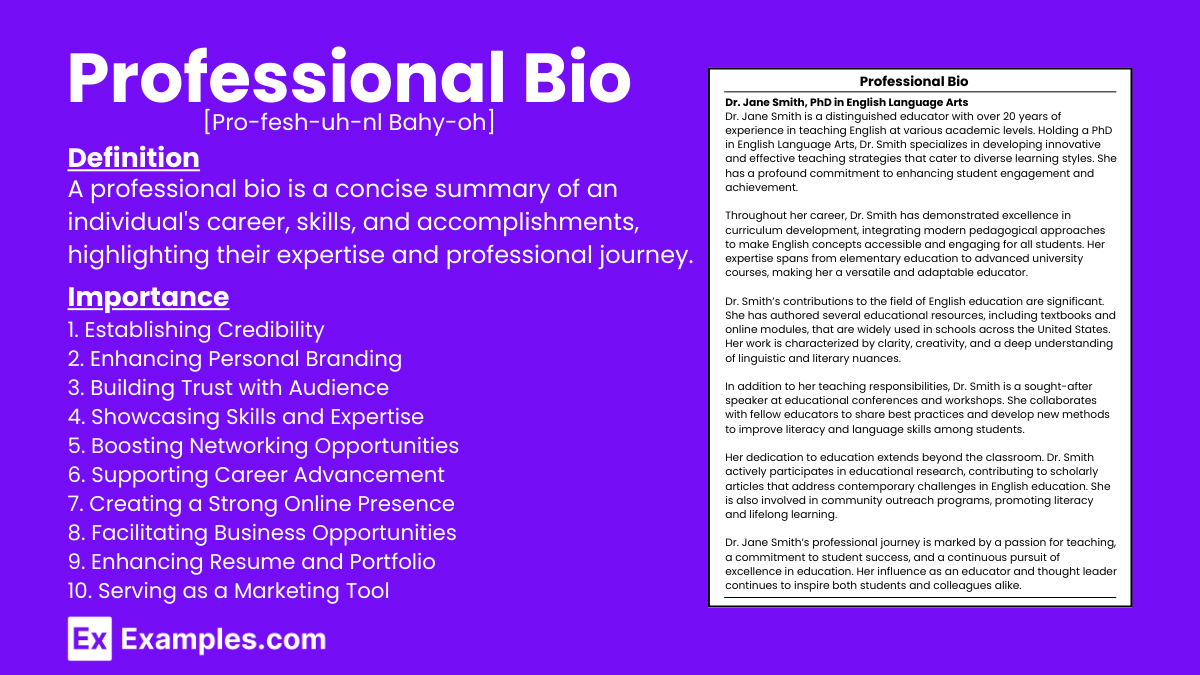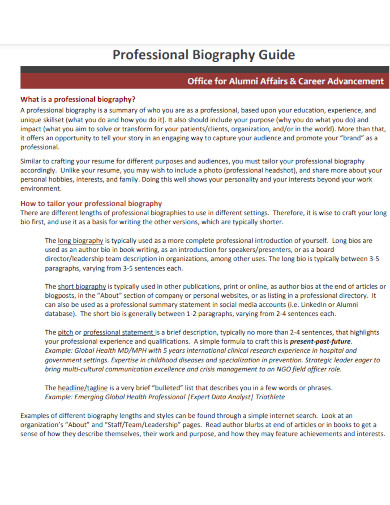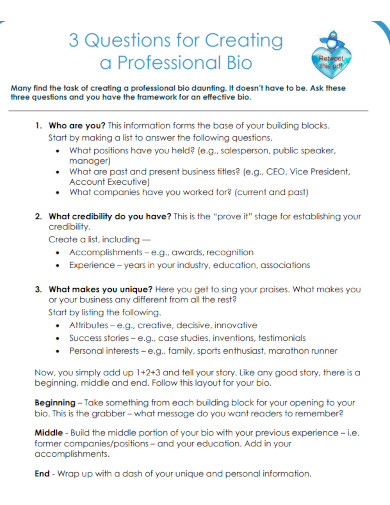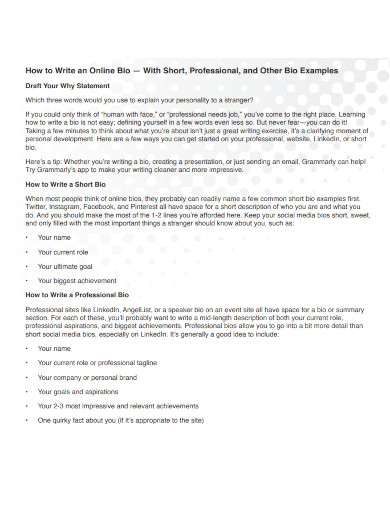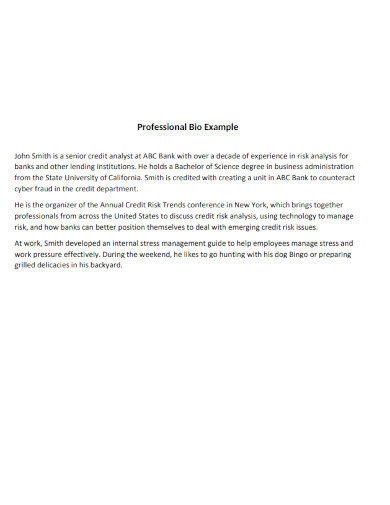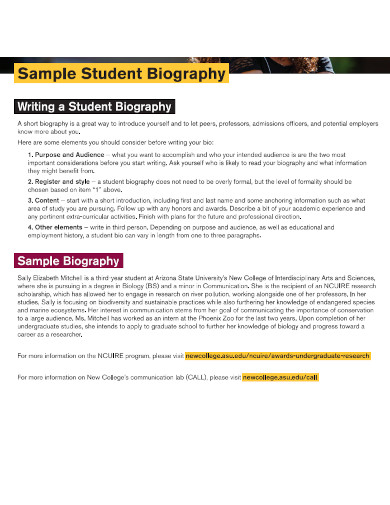18+ Professional Bio Examples
It goes without saying, many people tend to believe that short biographies and autobiographies are one and the same. However, there are not, and should not be mixed together or assumed as the same. There are a lot of different things to consider when you want a written biography and when you are writing someone’s biography.
What is a Professional Bio?
A professional bio is a concise summary of your personal and professional background, highlighting your expertise, achievements, education, and interests. It is often used on websites, social media profiles, and networking platforms to establish credibility and connect with your audience.
Professional Bio Format
[Your Full Name]
Your Job Title, Your Organization
Professional Summary
A brief paragraph summarizing your career highlights, key skills, and areas of expertise. Include any significant accomplishments or contributions that set you apart in your field.
Education
Degree Earned, Institution, Graduation Year
Professional Experience
Job Title
Organization Name, Location
Dates of Employment
Key responsibility or achievement
Skills and Expertise
Skill 1
Skill 2
Skill 3
Skill 4
Achievements and Awards
Award/Recognition, Year
Publications and Presentations
Publication Title, Journal/Publisher, Year
Professional Affiliations
Member, Organization Name
Volunteer Work and Community Involvement
Role, Organization, Dates
Personal Interests
Interest/Hobby
Contact Information
Email: Your Email Address
Phone: Your Phone Number
LinkedIn: Your LinkedIn Profile
Website/Portfolio: Your Website
Examples of Professional Bio for Work
1. Higher Education Professor
Dr. Jane Smith
Professor of English, University of California, Berkeley
Dr. Jane Smith is a renowned Professor of English at the University of California, Berkeley, with over 20 years of experience in modern American literature, literary theory, and creative writing. Holding a Ph.D. in English Literature from Stanford University, Dr. Smith has published three critically acclaimed books and numerous scholarly articles. Her innovative teaching methods and commitment to student success have earned her multiple awards, including the Distinguished Scholar Award from the Modern Language Association.
Contact: jsmith@berkeley.edu | (123) 456-7890 |
2. Middle School English Teacher
Mr. John Doe
7th Grade English Teacher, Lincoln Middle School
Mr. John Doe is an experienced 7th Grade English Teacher at Lincoln Middle School, with a Master’s Degree in English Education from the University of Illinois. Known for his engaging teaching style, Mr. Doe has developed a successful school-wide reading program and coached the debate team to regional championships. His passion for fostering a love of reading and writing in students has earned him the Teacher of the Year award at Lincoln Middle School.
Contact: jdoe@lincolnms.edu | (987) 654-3210 |
3. College Lecturer
Ms. Emily Johnson
Lecturer in English, Boston College
Ms. Emily Johnson is a dedicated Lecturer in English at Boston College, specializing in contemporary literature and composition. With a Master’s Degree in English from Harvard University, Ms. Johnson has over 15 years of experience teaching at the college level. She is highly regarded for her ability to make complex literary concepts accessible and engaging for her students. Her work has been published in several academic journals.
Contact: ejohnson@bostoncollege.edu | (555) 123-4567 |
4. High School English Teacher
Ms. Sarah Lee
English Teacher, Central High School
Ms. Sarah Lee is a passionate English Teacher at Central High School with over 10 years of experience. She holds a Master’s Degree in Secondary Education from the University of Michigan. Ms. Lee is committed to developing her students’ reading and writing skills through creative and interactive lessons. She has been recognized for her outstanding teaching with the Excellence in Education Award.
Contact: slee@centralhs.edu | (321) 654-9870 |
5. Elementary School Teacher
Mr. Robert Brown
5th Grade Teacher, Sunnydale Elementary School
Mr. Robert Brown is a 5th Grade Teacher at Sunnydale Elementary School, bringing 8 years of experience in elementary education. He has a Bachelor’s Degree in Education from the University of Wisconsin and is known for his innovative teaching strategies that engage young learners. Mr. Brown’s dedication to fostering a positive and inclusive classroom environment has made him a beloved teacher among students and parents alike.
Contact: rbrown@sunnydalees.edu | (789) 123-4560 |
Examples of Professional Bio for Executives
1. Chief Executive Officer (CEO)
Mr. John Maxwell
Chief Executive Officer, InnovateTech Solutions
Mr. John Maxwell is the Chief Executive Officer of InnovateTech Solutions, a leading technology firm specializing in AI-driven solutions. With over 25 years of experience in the tech industry, John has a proven track record of driving growth and innovation. He holds an MBA from Harvard Business School and a Bachelor’s Degree in Computer Science from MIT. Under his leadership, InnovateTech Solutions has achieved record-breaking revenues and expanded its global footprint.
Contact: jmaxwell@innovatetech.com | (123) 456-7890 |
2. Chief Financial Officer (CFO)
Ms. Laura Thompson
Chief Financial Officer, Global Ventures Inc.
Ms. Laura Thompson is the Chief Financial Officer at Global Ventures Inc., where she oversees all financial operations, including strategic planning, risk management, and financial reporting. With a CPA and an MBA from Stanford University, Laura brings over 20 years of financial expertise to the company. Her innovative financial strategies have significantly improved the company’s profitability and operational efficiency.
Contact: lthompson@globalventures.com | (987) 654-3210 |
3. Chief Operating Officer (COO)
Mr. Michael Davis
Chief Operating Officer, Green Energy Corp.
Mr. Michael Davis is the Chief Operating Officer at Green Energy Corp., a pioneering company in renewable energy solutions. Michael has an MBA from the University of Chicago and a Bachelor’s Degree in Mechanical Engineering from Stanford University. With over 20 years of experience in operations and supply chain management, he has successfully streamlined processes and increased operational efficiency, driving the company towards sustainable growth.
Contact: mdavis@greenenergycorp.com | (555) 123-4567 |
4. Chief Marketing Officer (CMO)
Ms. Sarah Williams
Chief Marketing Officer, Bright Future Enterprises
Ms. Sarah Williams is the Chief Marketing Officer at Bright Future Enterprises, where she leads the global marketing strategy, brand development, and customer engagement efforts. With a Master’s Degree in Marketing from NYU and over 15 years of experience in marketing and communications, Sarah has successfully launched multiple award-winning campaigns that have significantly boosted the company’s brand recognition and market share.
Contact: swilliams@brightfuture.com | (321) 654-9870 |
5. Chief Technology Officer (CTO)
Dr. Robert Johnson
Chief Technology Officer, NextGen Innovations
Dr. Robert Johnson is the Chief Technology Officer at NextGen Innovations, responsible for the company’s technological vision and development. He holds a Ph.D. in Computer Science from Caltech and a Bachelor’s Degree in Electrical Engineering from UC Berkeley. With over 20 years of experience in software development and IT management, Dr. Johnson has been instrumental in advancing the company’s technological capabilities and launching cutting-edge products.
Contact: rjohnson@nextgen.com | (789) 123-4560 |
Example of Professional Bio for Human Resources
1. Chief Human Resources Officer (CHRO)
Ms. Jessica Lee
Chief Human Resources Officer, Global Enterprises Ltd.
Ms. Jessica Lee is the Chief Human Resources Officer at Global Enterprises Ltd., overseeing all aspects of human resources strategy and operations, including talent acquisition, employee engagement, and organizational development. With a Master’s Degree in Human Resources Management from Cornell University and over 20 years of experience in HR leadership, Jessica has successfully implemented programs that have improved employee satisfaction and retention, driving the company’s growth and success.
Contact: jlee@globalenterprises.com | (123) 456-7890 |
2. Director of Human Resources
Mr. David Martinez
Director of Human Resources, Tech Innovators Inc.
Mr. David Martinez is the Director of Human Resources at Tech Innovators Inc., where he manages HR functions such as recruitment, training, performance management, and compliance. Holding a Bachelor’s Degree in Business Administration from UCLA and a Professional in Human Resources (PHR) certification, David has over 15 years of experience in building high-performing teams and fostering a positive workplace culture.
Contact: dmartinez@techinnovators.com | (987) 654-3210 |
3. Human Resources Manager
Ms. Karen Williams
Human Resources Manager, Creative Solutions LLC
Ms. Karen Williams is the Human Resources Manager at Creative Solutions LLC, responsible for overseeing employee relations, benefits administration, and talent management. With a Bachelor’s Degree in Human Resources from the University of Texas and over 10 years of experience in HR, Karen excels in creating strategic HR initiatives that align with business goals and enhance employee engagement and productivity.
Contact: kwilliams@creativesolutions.com | (555) 123-4567 |
4. Senior Human Resources Specialist
Mr. Michael Brown
Senior Human Resources Specialist, Future Enterprises
Mr. Michael Brown is a Senior Human Resources Specialist at Future Enterprises, specializing in talent acquisition, employee development, and HR analytics. With a Master’s Degree in Human Resources from the University of Michigan and over 12 years of experience in HR, Michael is known for his data-driven approach to solving complex HR challenges and his ability to develop comprehensive training programs.
Contact: mbrown@futureenterprises.com | (321) 654-9870 |
5. HR Generalist
Ms. Emily Johnson
HR Generalist, Bright Horizons Corp.
Ms. Emily Johnson is an HR Generalist at Bright Horizons Corp., where she handles a wide range of HR activities including recruitment, onboarding, benefits administration, and employee relations. With a Bachelor’s Degree in Psychology from the University of Florida and a SHRM-CP certification, Emily has over 8 years of experience in human resources and is dedicated to fostering a supportive and inclusive work environment.
Contact: ejohnson@brighthorizons.com | (789) 123-4560 |
Example of Professional Bio for Resume
Mr. John Anderson
Human Resources Manager
Professional Summary
Mr. John Anderson is an accomplished Human Resources Manager with over 15 years of experience in strategic HR management, talent acquisition, and employee engagement. Known for his innovative approach to HR, John has a proven track record of developing and implementing programs that enhance organizational efficiency and employee satisfaction. He holds a Master’s Degree in Human Resources Management from the University of Southern California and a Bachelor’s Degree in Business Administration from the University of Michigan.
Core Competencies
Talent Acquisition and Management
Employee Relations and Conflict Resolution
Performance Management
HR Policy Development and Compliance
Organizational Development and Change Management
Professional Experience
Human Resources Manager
Tech Solutions Inc., San Francisco, CA
January 2016 – Present
Oversee all HR functions, including recruitment, onboarding, training, and development.
Implemented an employee engagement program that increased employee satisfaction by 20%.
Developed and enforced HR policies and procedures to ensure compliance with labor laws and regulations.
Led the restructuring of the performance management system, resulting in improved productivity and employee morale.
Senior HR Specialist
Innovative Enterprises, Los Angeles, CA
June 2010 – December 2015
Managed talent acquisition processes, including job postings, candidate screening, and interviews.
Conducted training sessions on HR best practices and compliance issues.
Developed employee recognition programs that boosted morale and retention.
Assisted in the development of a comprehensive onboarding program for new hires.
HR Generalist
FutureTech Corporation, Austin, TX
August 2005 – May 2010
Handled employee relations issues, including conflict resolution and disciplinary actions.
Administered employee benefits programs and conducted open enrollment sessions.
Maintained accurate HR records and generated reports for senior management.
Supported the implementation of a new HRIS system, improving data management and accessibility.
Education
Master’s Degree in Human Resources Management, University of Southern California, 2010
Bachelor’s Degree in Business Administration, University of Michigan, 2005
Certifications
SHRM-SCP (Society for Human Resource Management – Senior Certified Professional), 2012
PHR (Professional in Human Resources), 2008
Professional Affiliations
Member, Society for Human Resource Management (SHRM)
Member, HR Certification Institute (HRCI)
Contact Information
Email: john.anderson@email.com
Phone: (123) 456-7890
Personal Statement
John Anderson is dedicated to fostering a positive and productive workplace environment. His strategic approach to human resources and commitment to continuous improvement have consistently driven organizational success. He is passionate about developing HR solutions that align with business goals and enhance the employee experience.
Example of Professional Bio for Students
Emily Carter
Undergraduate Student, University of Michigan
Professional Summary
Emily Carter is an enthusiastic undergradute student majoring in English Literature at the University of Michigan. With a passion for literature and writing, she has excelled academically, maintaining a 3.8 GPA. Emily is actively involved in the university’s literary magazine as an editor and has contributed to several publications. She aims to pursue a career in publishing or academia.
Education
Bachelor’s Degree in English Literature (Expected), University of Michigan, 2025
Academic Achievements
Dean’s List, 2022-2023
Published articles in the university’s literary magazine
Completed coursework in advanced literary theory and creative writing
Extracurricular Activities
Editor, University of Michigan Literary Magazine
Member, University Debate Team
Volunteer, Local Community Literacy Program
Skills
Strong writing and editing skills
Critical thinking and analysis
Research and academic writing
Public speaking and debate
Contact Information
Email: emily.carter@umich.edu
Phone: (123) 456-7890
Example of Professional Bio for Job
Mr. John Smith
Software Developer, Tech Innovators Inc.
Professional Summary
Mr. John Smith is a proficient Software Developer with over 5 years of experience in designing, developing, and implementing software applications. He holds a Bachelor’s Degree in Computer Science from the University of California, Berkeley. John is skilled in various programming languages and frameworks, including Java, Python, and React. His expertise lies in developing scalable web applications and improving software performance. John has a strong passion for coding and continuously seeks to learn and adopt new technologies.
Education
Bachelor’s Degree in Computer Science, University of California, Berkeley, 2016
Professional Experience
Software Developer
Tech Innovators Inc., San Francisco, CA
June 2019 – Present
Developed and maintained web applications using React and Node.js
Improved application performance by optimizing code and database queries
Collaborated with cross-functional teams to define and implement new features
Conducted code reviews and provided mentorship to junior developers
Junior Software Developer
Innovative Solutions, Los Angeles, CA
August 2016 – May 2019
Assisted in developing web applications using Angular and Java
Participated in daily stand-ups and sprint planning meetings
Debugged and resolved software defects
Wrote and maintained technical documentation
Skills
Proficient in Java, Python, and JavaScript
Experience with React, Angular, and Vue.js
Database management with SQL and NoSQL databases
Agile and Scrum methodologies
Problem-solving and debugging
Achievements
Improved web application performance by 25% through code optimization
Led a project that developed a new feature, increasing user engagement by 15%
Recognized as Employee of the Month for outstanding contributions to team projects
Contact Information
Email: john.smith@techinnovators.com
Phone: (123) 456-7890
More Examples & Samples for Professional Bio in PDF
1. Professional Biography Guide
2. 3 Questions for Creating a Professional Bio
3. Writing Online Professional Bio
4. Professional Bio Example
5. Writing a Student Professional Biography
Importance of Professional Bio
A professional bio is a brief summary of your skills, experiences, and accomplishments. Here are the key reasons why it is important:
1. First Impressions
A bio often serves as the first introduction to potential employers, clients, or colleagues, making a strong first impression.
2. Personal Branding
Your bio establishes your personal brand by highlighting your unique skills and experiences, differentiating you from others in your field.
3. Networking
A professional bio is essential for networking, providing a quick snapshot of your professional background to connect meaningfully with others.
4. Job Applications
A well-written bio complements your resume and cover letter, providing a narrative context to make your qualifications more compelling.
5. Online Presence
Your bio is crucial for your online presence on platforms like LinkedIn, personal websites, and social media, maintaining a consistent professional image.
6. Professional Growth
Writing a bio encourages self-assessment, helping you identify areas for professional growth and development.
7. Credibility and Trust
A detailed bio builds credibility and trust, showing that you are an experienced and capable professional.
8. Visibility
A professional bio increases your visibility in your industry, helping you get noticed by recruiters, peers, and potential clients.
9. Communication
Your bio succinctly conveys your professional story, helping others understand your career journey, achievements, and goals.
10. Opportunities
A strong bio can open doors to new opportunities like speaking engagements and collaborations.
What to Put in a Professional Bio?
A professional bio should be concise, engaging, and informative. Here are the key elements to include:
1. Name and Current Position
- Your full name.
- Your current job title or role.
- The organization you work for.
2. Professional Summary
- A brief overview of your career highlights.
- Key skills and areas of expertise.
- Mention of significant achievements or contributions.
3. Education
- Highest degree earned.
- Relevant educational qualifications.
- Institutions attended and graduation years.
4. Professional Experience
- Current and past job titles.
- Organizations worked for.
- Dates of employment.
- Key responsibilities and achievements in each role.
5. Skills and Expertise
- Specific skills related to your profession.
- Technical proficiencies or certifications.
- Soft skills that enhance your professional abilities.
6. Achievements and Awards
- Notable awards or recognitions received.
- Major projects or milestones accomplished.
7. Publications and Presentations
- Books, articles, or papers published.
- Conferences or events where you have presented.
8. Professional Affiliations
- Membership in professional organizations.
- Leadership roles within these organizations.
9. Volunteer Work and Community Involvement
- Relevant volunteer experiences.
- Community service or philanthropic activities.
10. Personal Interests
- Hobbies or interests that give a glimpse of your personality.
- Relevant personal projects or side ventures.
11. Contact Information
- Email address.
- Phone number (if appropriate).
- LinkedIn profile or professional social media links.
- Personal website or portfolio link (if available).
Professional Bio vs. Short Professional Bio
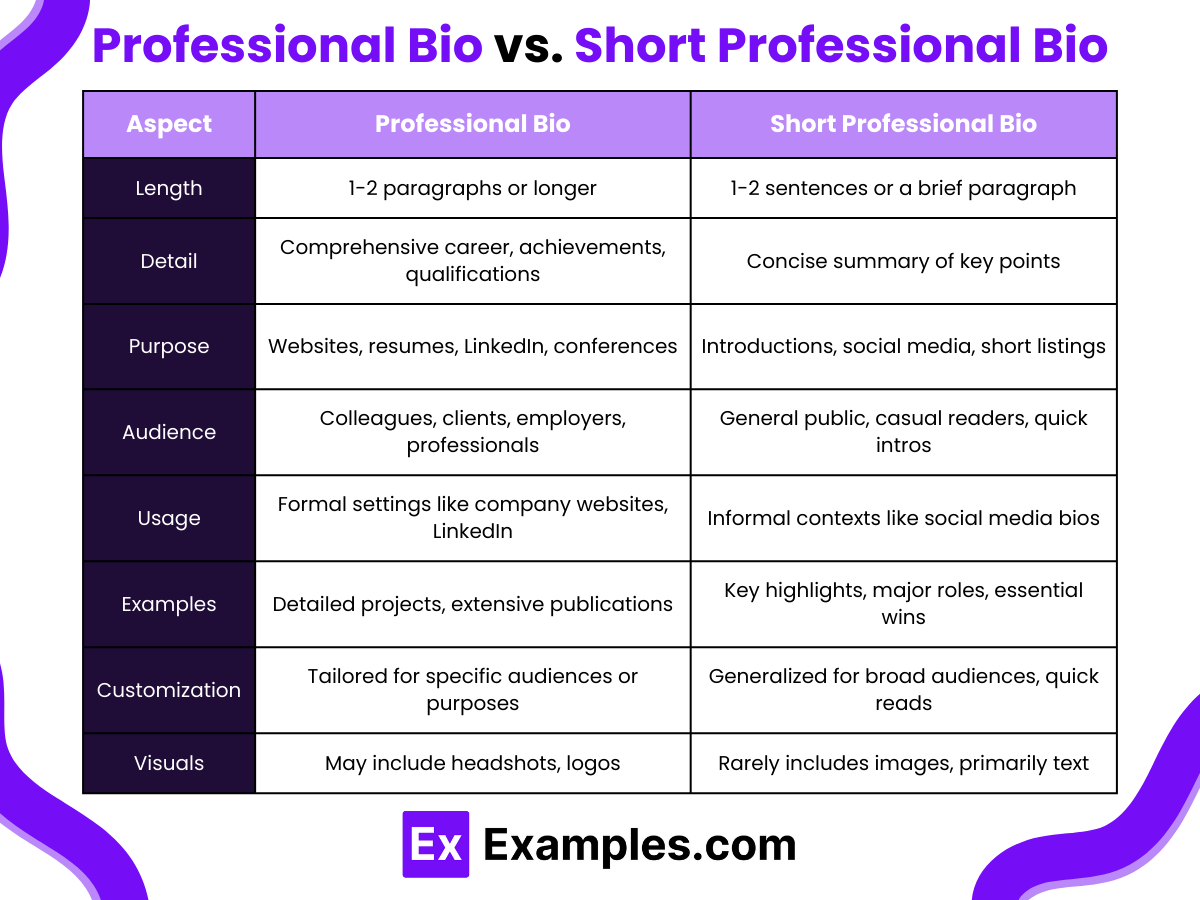
| Element | Professional Bio | Short Professional Bio |
|---|---|---|
| Length | 200-500 words | 50-150 words |
| Content Depth | Detailed overview of career highlights, skills, and achievements | Brief summary of key points |
| Professional Summary | In-depth summary | Concise overview |
| Education | Detailed list of degrees and institutions | Highest degree and institution |
| Professional Experience | Comprehensive list of job titles, organizations, and achievements | Current or most relevant position(s) |
| Skills and Expertise | Detailed list of specific skills | Key relevant skills |
| Achievements and Awards | List of notable awards and major projects | Highlight one or two significant achievements |
| Contact Information | Full contact details | Essential contact details |
How to Write a Professional Bio
1. Identify Your Purpose and Audience
Determine the purpose of your bio and who will be reading it. This will guide the tone, length, and content of your bio.
2. Start with Your Name and Current Position
Begin with your full name and your current job title or role. Include the name of the organization you work for.
3. Write a Professional Summary
Provide a brief overview of your career highlights, key skills, and areas of expertise. Focus on what sets you apart in your field.
4. Include Your Education
List your highest degree first, followed by other relevant educational qualifications. Include the institutions attended and graduation years.
5. Detail Your Professional Experience
Outline your most significant job titles, organizations, and dates of employment. Highlight key responsibilities and notable achievements in each role.
6. Highlight Skills and Expertise
List specific skills related to your profession. Include both technical skills and soft skills that enhance your professional abilities.
7. Mention Achievements and Awards
Include any notable awards or recognitions you have received. Highlight major projects or milestones you have accomplished.
8. Add Publications and Presentations (if applicable)
List any books, articles, or papers you have published. Mention any conferences or events where you have presented.
9. Include Professional Affiliations
List memberships in professional organizations. Mention any leadership roles within these organizations.
10. Add Volunteer Work and Community Involvement (if applicable)
Include relevant volunteer experiences and community service activities. This adds depth to your professional persona.
11. Mention Personal Interests (optional)
Share a few personal interests or hobbies to give a glimpse of your personality. This makes your bio more relatable.
12. Provide Contact Information
Include ways for others to reach you, such as your email address, phone number, LinkedIn profile, and personal website or portfolio link.
13. Edit and Proofread
Review your bio for clarity, conciseness, and grammatical accuracy. Ensure it flows well and is free of errors.
14. Update Regularly
Keep your bio up-to-date with your latest accomplishments, skills, and roles. Regular updates ensure your bio remains relevant and accurate.
Why is a professional bio important?
A professional bio creates a strong first impression, establishes personal branding, and highlights your skills and achievements, enhancing networking and career opportunities.
How long should a professional bio be?
A professional bio should be concise, typically between 200-500 words, providing enough detail to showcase your qualifications and achievements.
What should be included in a professional bio?
Include your name, current position, professional summary, education, experience, skills, achievements, affiliations, and contact information.
How often should I update my professional bio?
Update your bio regularly, ideally every 6-12 months, or whenever you achieve significant milestones or changes in your career.
Can I use the same bio for different platforms?
Yes, but customize it slightly to suit the audience and purpose of each platform, such as LinkedIn, personal websites, or professional profiles.
How can I make my bio stand out?
Highlight unique achievements, use a professional tone, include specific skills, and personalize it with a brief statement of your interests and goals.
Should I include personal interests in my bio?
Yes, mentioning personal interests can make your bio more relatable and give a well-rounded view of your personality.
How formal should my professional bio be?
The level of formality depends on your industry and audience; generally, maintain a professional tone while being engaging and authentic.
What are common mistakes to avoid in a professional bio?
Avoid using jargon, being too vague, writing in the third person if not suitable, and failing to proofread for errors.
Can I include quotes or testimonials in my bio?
Yes, including a brief quote or testimonial can add credibility and highlight your accomplishments through others’ perspectives.



